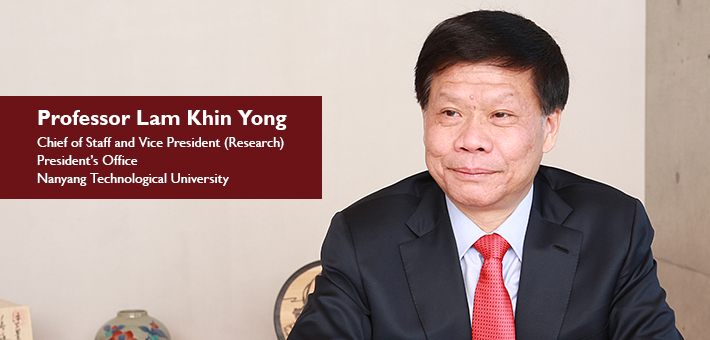
Tokyo Tech and Nanyang Technological University, Singapore (NTU) held a workshop at NTU on February 29 and March 1, 2016, where representatives of the universities' faculties explored opportunities for joint research. Professor Lam Khin Yong, Chief of Staff and Vice President (Research) of NTU, recently spoke about how he envisages the relationship between the two universities developing and about Tokyo Tech's current reform initiatives.
NTU-Tokyo Tech Workshop
Your relationship with Tokyo Tech goes back many years. How did it start and how has it developed recently?
I have been a frequent visitor to Tokyo Tech over the years. Back in 1989 when I was a lecturer at the National University of Singapore, I was selected as one of the first fellows of the Japan Society for the Promotion of Science (JSPS) and spent several weeks at Tokyo Tech. Fast forward to present day: I returned to Tokyo Tech again, this time as an invited speaker from Singapore to speak about NTU's administrative reforms at the university's kickoff symposium in January 2015 for its Top Global University Project funded by the Ministry of Education, Culture, Sports, Science and Technology (MEXT).
NTU and Tokyo Tech held a workshop from February 29 to March 1, 2016.
Can you provide some context from NTU's perspective?
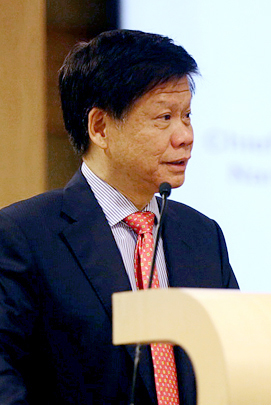
Speech at the workshop
When Dr. Yoshinao Mishima, the then-president of Tokyo Tech, was in Singapore in 2015, he met Professor Bertil Andersson, president of NTU. They explored possibilities for academic collaboration between the two universities. We feel that when contemplating collaboration, one has to first identify the relevant areas and faculty from both universities. The workshop provided a valuable opportunity for participants to learn about their counterparts' areas of expertise and aspirations to better formulate their vision and proposal for a joint research program.
NTU has extensive experience in international joint research programs, linking with companies and universities abroad. Rolls-Royce, BMW, local engineering powerhouse Singapore Technologies Engineering, University of Cambridge, and University of California, Berkeley are among our principal collaborators and key research partners. We are certainly looking forward to having Tokyo Tech join this distinguished group of partners.
Why is NTU promoting international joint research?
The international dimension amplifies the impact of scientific publications, and citation is a key bibliometric of measuring that impact. Studies indicate that citation of scientific papers with a multinational authorship tends to exceed that of papers whose authors all hail from one country.
If more faculty and researchers from more countries work together on a research theme, the resulting papers are likely to be cited much more frequently and in turn, drive greater impact. It is always gratifying to know that your work will reach a global audience rather than be limited to a readership within a single country.
Thoughts on Tokyo Tech's reforms
Tokyo Tech has embarked on far-reaching reforms. What are your thoughts on the Institute's initiative?
It is a highly positive development that is of great interest to us at NTU. Tokyo Tech's plan addresses virtually all the critical areas for a university: education, research, internationalization or globalization, industry-academia collaboration, and administrative reform. We are impressed with the level of detail in Tokyo Tech's strategic plan.
In terms of education reform, I think one of the notable attributes of the initiative is the broadening of the curriculum as well as its deepening where it matters. When it comes to innovation, it is always good to provide students with a broad education and exposure to different cultures and environments. In this era of rapid change and innovation, engineers and scientists need to be motivated by high expectations that their research will have a substantial impact on the economy, society, or in other ways. A solid grounding in the social sciences and humanities is also beneficial for engineers and scientists.
On the other hand, one also needs to deepen students' knowledge. So the challenge is striking the right balance between the broadening of the curriculum and the deepening of certain areas. Accordingly, Tokyo Tech's intention to include liberal arts components in the PhD curriculum should be warmly welcomed.
In the research Tokyo Tech is undertaking, what strikes you as particularly noteworthy?
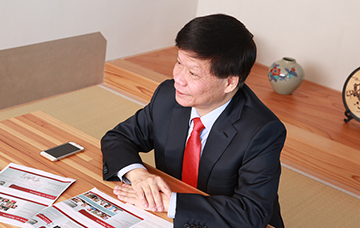
Two things stand out. First is the interdisciplinary nature of some of the proposed programs. This interdisciplinary nature is especially important, for example, in energy research and in the area of cyber security. Even in the natural sciences, a mix of various disciplines such as mechanical engineering, chemistry, mathematics, and information science is highly desirable. One also needs to work with colleagues from humanities and the social sciences. Social scientists and behavioral scientists can make valuable contributions in providing a well-rounded perspective. It is therefore significant that Tokyo Tech's Earth-Life Science Institute (ELSI), which has been adopted by the World Premier International Research Center Initiative (WPI) of MEXT of Japan, is conducting interdisciplinary research.
Secondly, Tokyo Tech is receiving substantial funding from the Japanese government for competitive research. For example, ELSI has secured 10 years of funding from MEXT. Secured funding enables researchers to focus more fruitfully on their research themes, without being distracted by the need to deliver immediate results.
Is NTU promoting interdisciplinary research?
We have been promoting interdisciplinary research for quite a while. At NTU, research institutes are positioned at the university level with support from the various schools and departments. They are given some autonomy but their core mission is to bring faculty from all over the university to work together and secure external research funding. They also accept students from the various departments and schools. In short, NTU's university-level interdisciplinary research institutes are a platform for promoting interdisciplinary research as well as for encouraging students and faculty from different departments to work constructively together.
Key areas for collaboration
What is NTU's view on the role of student exchanges?
Offering students a broad-based education through student exchange programs is a strand of our DNA at NTU, and the ratio of joint student exchanges and study programs is a key performance indicator for NTU. Many of our undergraduate students spend a semester or even an academic year overseas.
Thus, student exchanges are a powerful tool for exposing NTU students to cultural diversity and different ways of accomplishing goals. We also welcome students from overseas because networking with diverse students drawn from a global catchment area enriches the educational experience of Singaporean students.
NTU has a student exchange program with Tokyo Tech. How is that progressing?
The exchange program with Tokyo Tech is important for NTU. While Tokyo Tech students are at NTU, they are exposed to students and faculty from all over the world, interacting with them on a daily basis. Furthermore, Rolls-Royce, BMW, and other leading companies have set up R&D labs at NTU.
For NTU students, we hope to offer link-up opportunities through Tokyo Tech. We have two examples in this regard. The most recent example is a program agreed in April 2016 with Technion - Israel Institute of Technology and Korea Advanced Institute of Science and Technology. I3 (I-Cube): Institute for International Innovation, another example of our research exchange initiatives, involves Hebrew University in Israel, Korea University, and NTU. These programs are characterized by a tripartite link-up between Israel, a noted start-up nation, Korea, a country known for its major manufacturers, and Singapore, a hub for the regional headquarters and R&D facilities of leading multinational corporations (MNCs). I think we can do something similar with Tokyo Tech and establish partnerships with the leading local MNCs with global operations, in electronics and other sectors.
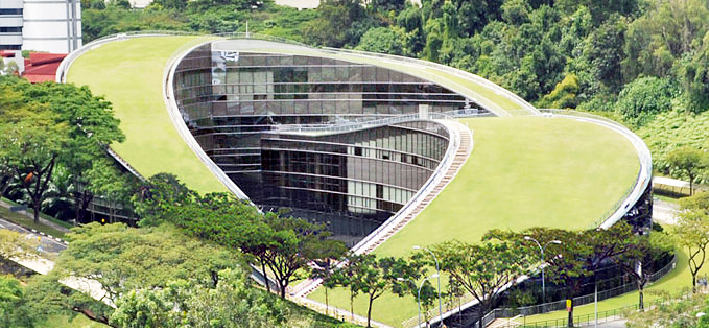
NTU's iconic School of Art, Design and Media (ADM) Building
So NTU envisages a closer exchange relationship with Tokyo Tech in research?
In addition to exchanges of undergraduate students, we should offer greater exchange opportunities for graduate students and research staff, and even for administrative staff. The NTU-Tokyo Tech workshop held in February 2016 identified three key areas for collaboration: environmental engineering, new molecular chemistry for energy and fuel, and interfacial science in biomedicine and medical technology. These are key areas for NTU as well as for Tokyo Tech. My recommendation is that NTU and Tokyo Tech start joint research in these three areas, or at least one or a couple of them, as soon as possible, using their own resources.
At some stage, NTU and Tokyo Tech can also seek research funding from their respective country's funding agencies or from industry, although that may take a while. At NTU, we call this triple helix collaboration or the triple helix model. We would like to establish a scheme of this type with Tokyo Tech too.
What we mean by triple helix is that a university, such as NTU or Tokyo Tech, is the first element of the helix. The second element is a company or another overseas university or research institution. And the third element is a national funding agency or the like. Sometimes even when working with companies, you may need some measure of co-funding and support from the funding agency to get the research going. The triple helix model is a proven, effective model that has delivered great benefits for NTU and its partners. Likewise, we think this model could bring enormous advantages to Tokyo Tech, and NTU would be glad to work with our counterparts in Tokyo Tech to secure both industry and public agency funding to advance our research and innovation objectives.
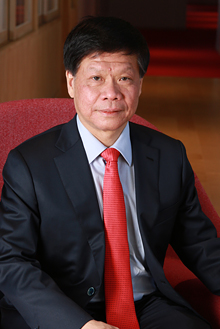
Professor Lam Khin Yong
Profile
- 2014 - presentVice President (Research), NTU
- 2011 - presentChief of Staff, NTU
- 2008 - 2011Associate Provost (Graduate Education & Special Projects), NTU
- 2006 - presentProfessor, School of Mechanical & Aerospace Engineering, NTU
- 2006 - 2008Dean/Chair, School of Mechanical & Aerospace Engineering, NTU
- 2003 - 2006Founding Executive Director, A*STAR Graduate Academy
- 2002 - 2004Director, MD's Office, A*STAR
- 1999 - 2005Professor, Department of Mechanical Engineering, NUS
- 1998 - 2003Founding Executive Director, Institute of High Performance Computing (IHPC)
- 1994 - 1999Associate Professor, Department of Mechanical Engineering, National University of Singapore(NUS)
- 1994 - 1998Founding Director, Centre for Computational Mechanics, NUS
- 1989 - 1994Senior Lecturer, Department of Mechanical Engineering, NUS
The Special Topics component of the Tokyo Tech Website shines a spotlight on recent developments in research and education, achievements of its community members, and special events and news from the Institute.
Past features can be viewed in the Special Topics Gallery.
. Any information published on this site will be valid in relation to Science Tokyo.









